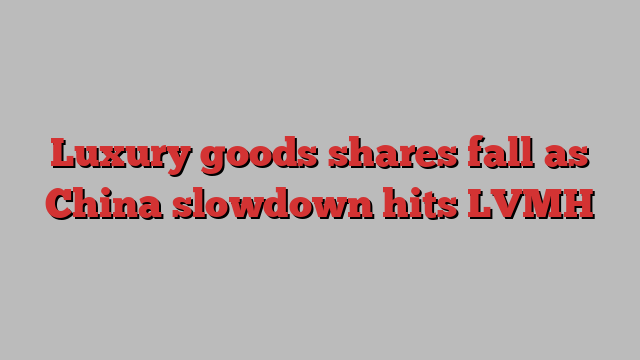
Unlock the Editor’s Digest for free
Roula Khalaf, Editor of the FT, selects her favourite stories in this weekly newsletter.
Luxury shares tumbled on Wednesday after industry bellwether LVMH reported a bigger than expected fall in quarterly sales due to weak consumer demand in China.
Shares in the Paris-listed firm LVMH, which is controlled by French billionaire Bernard Arnault, fell as much as 7.5 per cent in early trading to their lowest level since July 2022, before recovering some ground to trade down 4 per cent on the day. The owner of the Louis Vuitton and Dior brands has fallen about 18 per cent so far this year as global demand for luxury goods has softened.
Other luxury stocks also lost ground, with Cartier owner Richemont down 1.2 per cent, Hermès down 1.5 per cent and Kering, which is in the middle of a fraught turnaround at top brand Gucci, down 2.1 per cent.
Beauty leader L’Oréal also dropped 2.6 per cent as investors worried that the more sombre outlook for luxury goods would carry across to more affordable indulgences in skincare and cosmetics.
LVMH’s third-quarter revenues miss “came from deteriorating trends from the Chinese customer whilst the other nationalities did not see much improvement”, said Carole Madjo, an analyst at Barclays. “We believe the miss will be perceived as a negative read-across for the rest of the sector and reflects the fact that earnings downgrades in the sector are still ongoing.”
Sales at LVMH’s core fashion and leather goods division fell 5 per cent in the third quarter year on year, missing consensus forecasts for a 1 per cent rise. It is the first time the unit has posted falling sales since 2020 during the Covid-19 pandemic.
The company’s overall revenues fell 3 per cent to €19.1bn compared with the same period last year. Analysts had been expecting a 1 per cent increase.
LVMH’s sales in Asia outside of Japan — a region dominated by China — fell 16 per cent in the third quarter, while those in the US, the biggest luxury market, were flat. Sales growth in Japan remained in the double digits, although it was lower than during the first half of the year.
Consumer confidence in mainland China has reached Covid-era lows, the group’s chief financial officer Jean-Jacques Guiony told analysts. “Most of our markets currently face economic challenges, including mainland China,” he said.
Having fuelled much of the industry’s growth in the past decade, Chinese shoppers have reined in their spending due to concerns about their country’s darkening economic outlook and weak housing market. At the same time, global demand for luxury goods — particularly from aspirational middle-class consumers who had built up extra savings during pandemic lockdowns — has faded, putting pressure on luxury companies that had grown rapidly by catering to these new customers.
LVMH’s update, which kicks off the reporting period for luxury companies, “confirms a tough industry backdrop in recent months, with the Chinese cluster slowing from high single-digit gains” in the first half of the year to a “mid single-digit contraction” in the third quarter, said James Grzinic, an analyst at Jefferies.
“Recent stimulus announcements [from China] are unlikely to have turned the tide,” he added.